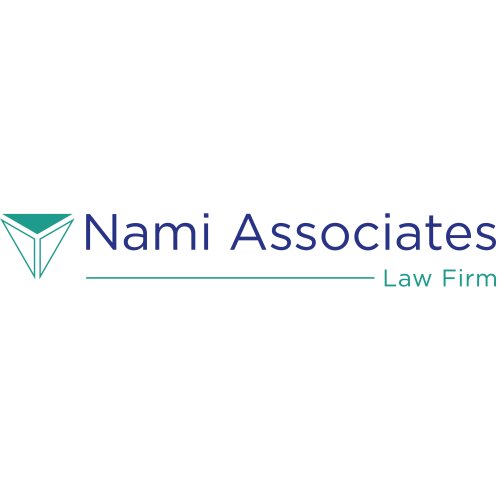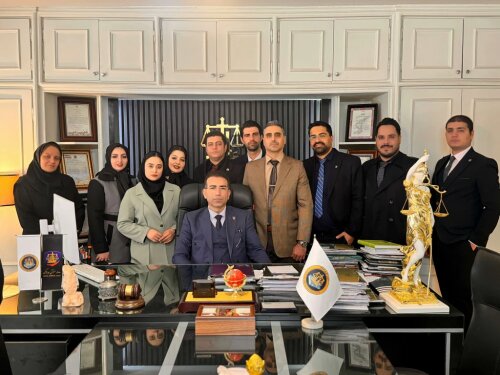Best Natural Resources Lawyers in Iran
Share your needs with us, get contacted by law firms.
Free. Takes 2 min.
Or refine your search by selecting a city:
List of the best lawyers in Iran
About Natural Resources Law in Iran
Natural resources law in Iran encompasses a broad range of legislative measures governing the management, use, and protection of natural resources, such as oil, gas, minerals, water, forests, and wildlife. Given Iran's vast and diverse ecology, the country's natural resources are pivotal to its economy and ecological health. The legal framework is designed to ensure sustainable development while balancing economic growth and environmental conservation. The Iranian government has put in place a series of regulations and institutions to manage these resources and ensure their responsible utilization.
Why You May Need a Lawyer
Engaging a lawyer skilled in natural resources law can be crucial for various reasons. Common situations where legal assistance might be needed include:
- Disputes over land use and rights, especially concerning agricultural, mining, or oil extraction activities.
- Compliance with environmental laws and regulations for businesses involved in resource extraction or utilization.
- Negotiating contracts or joint ventures, particularly with foreign entities in oil and gas sectors.
- Environmental impact assessments and obtaining necessary permits for development projects.
- Resolution of conflicts between governmental bodies and local communities over resource management.
- Lawsuits or legal actions related to environmental damage or resource mismanagement.
Local Laws Overview
Iran's natural resources laws are primarily governed by the country's constitution, specifically articles related to public ownership and protection of natural resources. Key laws include:
- Oil and Gas Legislation: These laws regulate the exploration, extraction, and distribution of hydrocarbons, maintaining state control over these sectors.
- Environmental Protection and Enhancement Act: This act outlines measures for protecting Iran’s ecology from the adverse effects of industrial activities.
- Forest and Rangeland Laws: Enacted to preserve Iran's forests and pastures, these laws control exploitation and mandate reforestation efforts.
- Water Resources Management: Laws under this category govern the allocation, usage, and conservation of water resources, addressing issues such as drought management and irrigation.
Frequently Asked Questions
What is the primary regulatory body for natural resources in Iran?
The Ministry of Energy and the Ministry of Petroleum are the two main bodies regulating various aspects of natural resources in Iran.
Can foreign companies own natural resources in Iran?
No, under Iranian law, natural resources are public property, and foreign entities cannot own them. However, they can enter into service contracts to work in extraction.
Are there penalties for non-compliance with environmental laws in resource extraction?
Yes, penalties include fines, imprisonment, operational shutdowns, and compensation payments for environmental damage.
What is the process for obtaining a mining permit in Iran?
The applicant must apply to the Ministry of Industry, Mine and Trade, providing necessary studies and impact assessments. Approval processes vary depending on the project scale.
How are water rights regulated for agricultural use?
Water rights are controlled by regional water authorities and are based on historic usage and needs analysis to balance consumption and conservation.
What role do local communities play in resource management?
Local communities can be stakeholders in decision-making processes, especially concerning land and resource use impacting their environment and livelihoods.
How can a business ensure compliance with natural resources laws?
Engaging legal experts familiar with Iranian regulations, conducting thorough impact assessments, and cooperating with government agencies and local authorities can ensure compliance.
Does Iran participate in international environmental agreements?
Yes, Iran is a signatory to several international environmental covenants focused on biodiversity, climate change, and desertification.
What laws protect Iran's forests and wildlife?
Laws such as the Forest Protection and Utilization law and various wildlife protection regulations aim to conserve these natural resources against over-exploitation and poaching.
Is renewable energy development covered under natural resources laws?
Yes, the government encourages renewable energy projects through incentives and regulations aimed at reducing reliance on fossil fuels.
Additional Resources
To gain more insight into natural resources in Iran, consider reaching out to or consulting:
- Iran's Ministry of Energy: Manages policies related to water and power resources.
- Ministry of Petroleum: Provides guidelines and policies for the oil and gas industry.
- Department of Environment: Oversees environmental protection regulations and conservation initiatives.
- Iranian Universities and Research Centers: Offer academic studies and expert analysis on natural resource management.
Next Steps
If you require legal assistance in natural resources, consider the following steps:
- Consult with Iranian law firms specializing in natural resources and environmental law.
- Gather all relevant documentation and information related to your situation.
- Engage with local communities and stakeholders if your issue affects them.
- Seek out expert opinions or consultancy services from environmental and resource management specialists.
- Ensure that any legal representation you hire has credentials and experience in handling similar cases within Iran's legal framework.
Lawzana helps you find the best lawyers and law firms in Iran through a curated and pre-screened list of qualified legal professionals. Our platform offers rankings and detailed profiles of attorneys and law firms, allowing you to compare based on practice areas, including Natural Resources, experience, and client feedback.
Each profile includes a description of the firm's areas of practice, client reviews, team members and partners, year of establishment, spoken languages, office locations, contact information, social media presence, and any published articles or resources. Most firms on our platform speak English and are experienced in both local and international legal matters.
Get a quote from top-rated law firms in Iran — quickly, securely, and without unnecessary hassle.
Disclaimer:
The information provided on this page is for general informational purposes only and does not constitute legal advice. While we strive to ensure the accuracy and relevance of the content, legal information may change over time, and interpretations of the law can vary. You should always consult with a qualified legal professional for advice specific to your situation.
We disclaim all liability for actions taken or not taken based on the content of this page. If you believe any information is incorrect or outdated, please contact us, and we will review and update it where appropriate.
Browse natural resources law firms by city in Iran
Refine your search by selecting a city.
















